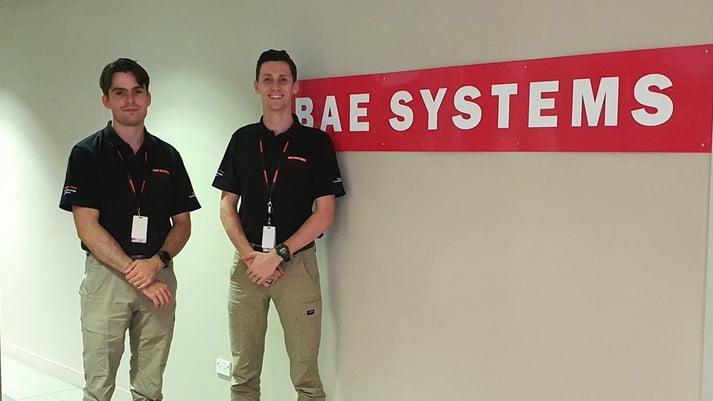Jordan Shipard is the latest SmartSat PhD student to complete a successful internship, this time within the Australian space industry.
A SmartSat PhD student from Queensland University of Technology (QUT), Jordan is no stranger to working in the space industry. During the final year of his undergraduate degree, he worked remotely for BAE Systems in Cairns while conducting research relating to neural architecture in partnership with Sentient Vision Systems (now Shield AI).
This work sparked Jordan’s interest in artificial intelligence (AI), leading to him pursue his PhD in Efficient Subnets for Scalable Onboard AI in Space with the Signal Processing, Artificial Intelligence and Vision Technologies (SAIVT) Lab at QUT.
 Jordan Shipard (left) during his internship at BAE Systems
Jordan Shipard (left) during his internship at BAE Systems
(image courtesy of Asia-Pacific Defence Reporter)
Earlier this year, Sentient Vision Systems was acquired by Shield AI, a US-based defence technology company building the world’s best AI pilot. This made it the best place for Jordan to complete an industry internship to see what impact his research could really have on the Australian space sector, and the world more broadly.
Q. Tell me about your SmartSat project, and the impact you hope your research will have?
My SmartSat project focuses on developing efficient subnets for scalable onboard AI in space. I chose this topic because I want my research to have a practical impact, and I see great potential in building an AI training framework that can be used to train AI models directly onboard satellites in large constellations.
Currently, I’m working on combining Federated Learning with Generalised Category Discovery for Earth Observation data. While Generalised Category Discovery is typically applied as a classification task, its core concept of identifying new, unseen categories from existing data can theoretically be applied to any data collected by satellites. I believe that this method could enable more efficient scientific exploration. By leveraging a network of AI models onboard satellites, we could quickly identify groups and patterns in the data.
 Shield AI acquired Australian company Sentient Vision Systems in order to establish a headquarters in Australia earlier this year
Shield AI acquired Australian company Sentient Vision Systems in order to establish a headquarters in Australia earlier this year
(image courtesy of Sheild AI)
Q. What did it mean to you to intern at Shield AI (formerly Sentient Vision Systems)?
Interning at Shield AI was a valuable opportunity to gain real-world experience. It gave me a fresh perspective on the purpose of academic research and its broader role within the engineering ecosystem. Additionally, it was a great chance to collaborate with others and be part of a team, contributing to meaningful projects at Shield AI.
Q. How did your time at Shield AI impact your research?
In addition to offering a fresh perspective on research, my time at Shield AI provided a much-needed break and reset. After working intensively on the same research topic for two years, it can be easy to feel mentally fatigued. Shifting my focus to a new body of work allowed me to return to my research with renewed enthusiasm and fresh ideas.
Q. What did you learn during your time at Shield AI?
During my time at Shield AI, I was reminded of the value of essential skills I had overlooked, such as maintaining weekly notes and staying organised in all aspects of my work. Working as part of a team again highlighted how critical these skills are for effectively communicating progress and collaborating with others. It reinforced the importance of structure and clear communication within a team setting.
Q. Who were your mentors during your time at Shield AI, and what did you learn from them?
My two mentors at Shield AI were Adjunct Principal Engineer Associate Professor Arnold Wiliem, and Deep Learning Engineer Ben Boxer. Arnold, who is also one of my PhD supervisors, has been instrumental in shaping my understanding of academic research throughout my entire Doctorate program.
Ben, on the other hand, taught me how to structure my daily work in a way that ensured consistent progress, regardless of experimental outcomes—a valuable skill I will carry into my research. I also learned how to conduct research with the goal of developing new capabilities for a company, as opposed to solely focusing on publishing research papers.
Q. What aspirations do you have for your career moving forward, and how has this internship helped you get closer to these goals?
My main aspiration has always been to find fulfilment in my work and to create something that benefits others. This internship helped me realise that a career in industry may align more closely with these personal goals, potentially more so than continuing in academia. My goal is to contribute beyond just earning a doctorate; I want to make a real impact on the world.
Q. Would you recommend an industry internship to other PhD candidates looking to work in the Australian space sector?
It really depends on the individual. Some may already know that an internship isn’t the right path for them, and in those cases, it might not make sense. However, for anyone who is unsure or considering whether an internship is right for them, I would definitely recommend it. It’s a great opportunity to gain practical experience and insights that can complement academic research.
I believe the Australian space sector would benefit from closer collaboration with academia overall, and internships provide an excellent opportunity for students to bridge the gap between research and industry.
Jordan Shipard completed a Bachelor of Engineering (Honours) and a Bachelor of IT from the Queensland University of Technology (QUT) in 2021, majoring in Mechatronics and Computer Science. His research focuses on developing a method for training AI across a constellation of satellites for Earth observation tasks, requiring topics of AI research relating to federated learning, few-shot learning, vision-language models, and efficient transformer models.